The EUGlobalGreen Speaker Series will be online, recorded, conference-debates, in English and French, lasting 2 hours, in which one speaker will impart their in-depth expert knowledge on the role of the EU with regards to environmental challenges. The presentation will be followed by a short kick-off discussion by another invited expert, followed by extensive Q&A interactions with the audience.
Such interactive sessions through the Speaker Series will enable participants to develop their critical mind and abilities to share and question data and interpretations. The Speaker Series will be open to all students (bachelor’s, master’s, PhD), researchers and civil society representations at USL-B and beyond. Potential speakers will be selected according to diverse origins, gender and thematic specialization, and professional occupation (academics and practitioners including diplomats from EU and third countries).

Speakers’ series #14 – Governance of Biodiversity in Europe: The Case of Natura 2000
April 10, 2025
With: Camille Rivière (EHESS)
Abstract: Camille Rivière holds a PhD in sociology from the School for Advanced Studies in the Social Sciences (EHESS) and is currently a postdoctoral researcher at ENGIE Lab Crigen (France). As part of the EUGlobalGreen Speaker Series, she will present her doctoral research on Natura 2000, the European Union’s flagship policy for biodiversity conservation. This lecture will be integrated into the “EU Politics” course.
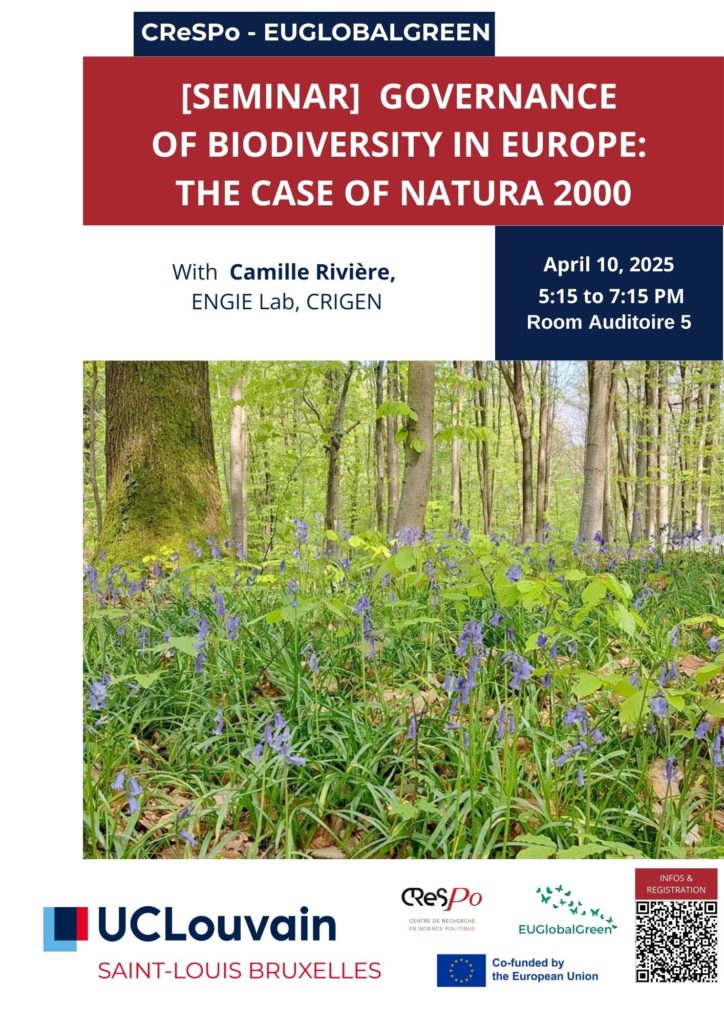
Speakers series #13 – Sustainable Development Goals – negotiation process and implementation efforts
March 17, 2025
With: Yi hyun Kang (Post doctoral fellow, Lund University)
Abstract: This seminar examines the key concepts underpinning the discussion of the 2030 Agenda and the Sustainable Development Goals (SDGs). The SDGs have been the central policy framework of the United Nations since 2015. For 10 years, global efforts have been made to implement the SDGs around the world, but the progress towards the goals has been slow. The seminar will address the historical background of global sustainability governance, followed by an overview of analyses of SDG implementation.
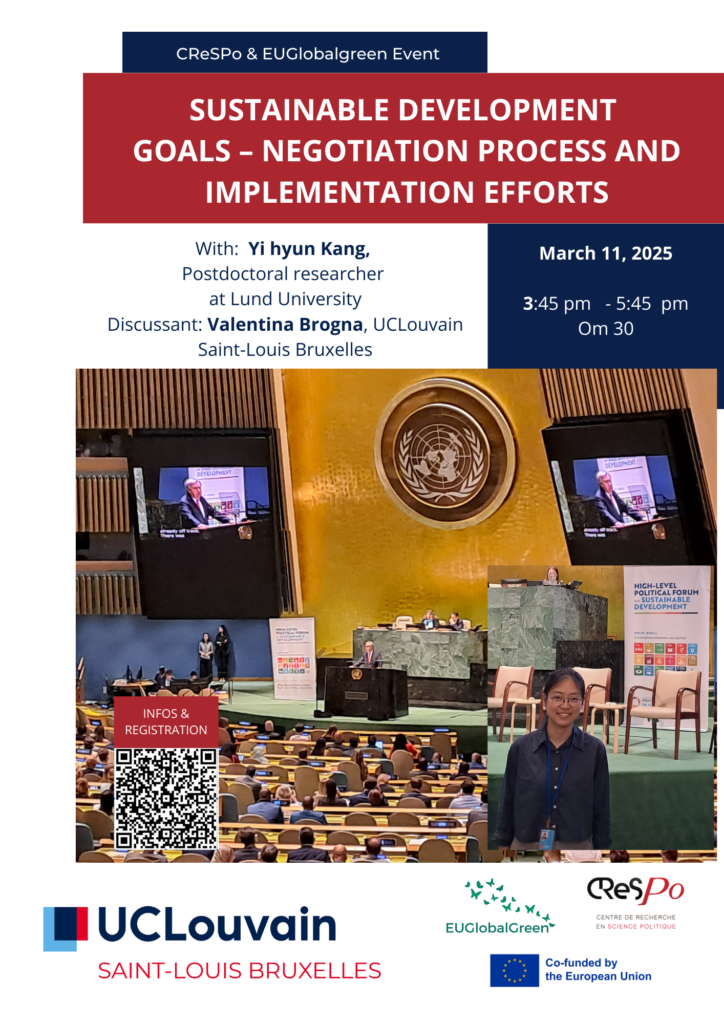
Speakers series #12 – Kids on climate – a project to explore links between climate change, emotions, political socialization and (dis)engagement
November 15, 2024 @ 12:30 pm – 2:30 pm
With: Katharine Throssell, Chercheuse postdoctorante, SciencesPo Bordeaux
Abstract: What does it mean to grow up learning about politics in a context marked by the climate crisis? What if your first awareness of a political issue was one that politicians seem unable to solve? KIDSONCLIMATE investigates how young teenagers’ awareness of the climate crisis, and the emotions it generates, might impact their (dis)engagement with politics at different levels (national, local, European). It uses existing quantitative data from the IEA (International Association for the Evaluation of Educational Achievement) International Civics and Citizenship Education Study (ICCS) along with innovative qualitative methodologies with 13-year-olds and their parents in two countries (Belgium and France) to ask: how do the emotions generated by the climate crisis impact young teens’ support for the political system they live in and their feelings of political belonging? What are the social, political, educational, and media factors that influence these emotions? At a time when the effects of the climate crisis are ever more visible and dramatic, and many young people are turning away from institutional politics, or towards populism and the far right, we urgently need to understand how the emotions resulting from this context might impact how young people feel about their political system and their place within it.
Discussants: Emilie Van Haute, professor of political science, Université libre de Bruxelles (ULB) & Teresa Cabrita, professor of EU Law, UCLouvain Saint-Louis Bruxelles
Chair: Florence Delmotte, UCLouvain Saint-Louis Bruxelles
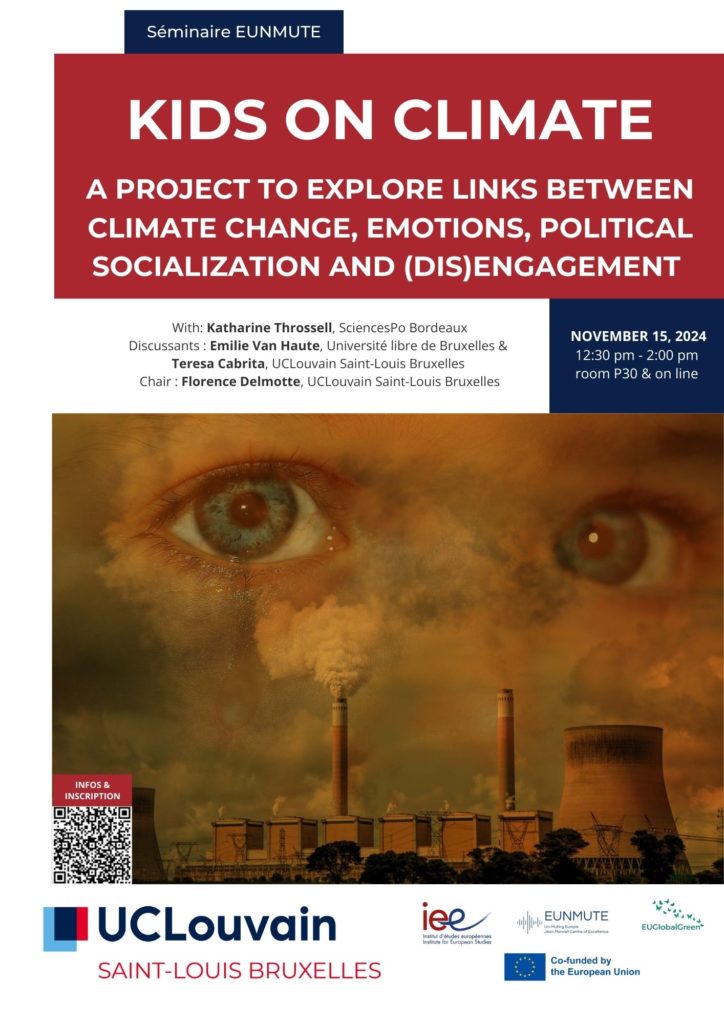
Speakers series #11 – Multi-level governance of energy transitions
November 18, 2024
With Marie-Claire Brisbois (University of Sussex)
Video in progress.
Marie-Claire Brisbois is a Senior Lecturer in Energy Policy at the University of Sussex. Her research focuses on the interplay of power, politics, and influence in the governance of energy, water, and climate issues. As a guest speaker in the EUGlobalGreen Speaker Series, she will deliver a lecture on the multi-level governance of energy transitions. This lecture will be part of the International Relations course.
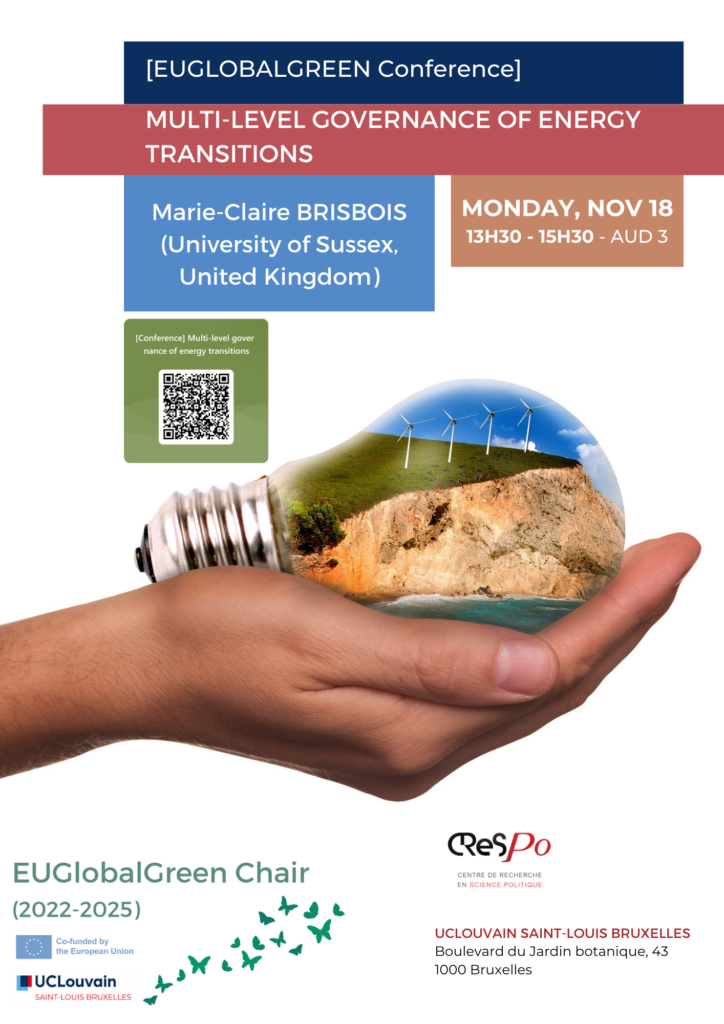
Speakers series #10 – The European Council, the Council, and the European Green Deal
February 20, 2024
With Jeffrey Rosamond (Ghent University)
We assess the response of the European Council and the Council of the European Union (hereafter the Council) to the emergence and development of the European Green Deal (EGD). First, we conduct a literature review of the historical role of the two intergovernmental institutions in EU climate policy development, drawing inspiration from new intergovernmentalism, historical institutionalism, and discursive institutionalism. Next, we provide an overview of the EGD itself and three of its core elements: (1) the ambition to achieve climate neutrality by 2050; (2) its systemic and integrative nature; and (3) the just transition approach. We then present the results of a qualitative content analysis of all Council and European Council Conclusions from 2018 to 2020. Our findings show that the European Council and the Council have declared support for the EGD and its underlying principles. The European Council engaged with all three elements but mentioned the objective of achieving net-zero emissions by 2050 most frequently and with growing intensity over the years studied. The Council similarly discussed the three elements of the EGD and gave increasing focus to the integrated/systemic transition over the course of the years 2018–2020. Our empirical analysis suggests that, on paper, the Council and the European Council may manage to govern through the organisational turbulence of member state divisions on climate governance. Furthermore, environmental turbulence arising from external contexts (e.g., economic and health crises) did not dampen their declared support towards the goals of the EGD.
Speakers series #9 – Challenging conventional narratives on trade unions’ attitudes towards decarbonisation
February 8, 2024
With Anne Guisset (KULeuven)
Abstract: Présentation et discussion autour de la chaine Philoxime (https://www.youtube.com/c/Philoxime) sur les questions d’éthique et de climat. Maxime Lambrecht explique la philo politique et l’éthique du climat avec des GIFs et des animaux rigolos. Cette intro aux principales théories éthiques d’aujourd’hui sert à réfléchir à des questions pratiques liées au dérèglement climatique, aux mouvements sociaux ou à l’éthique de l’information. L’objectif de la chaîne est de tenter d’améliorer la qualité du débat public sur les questions éthiques, politiques et sociales, via une approche philosophique animée par le principe de charité interprétative et la recherche de la clarté, et nourrie de l’apport des autres disciplines scientifiques.
Speakers series #8 – Comment vulgariser les questions de justice environnementale?
November 24, 2023
Par Maxime Lambrecht (Philoxime)
Abstract: Présentation et discussion autour de la chaine Philoxime (https://www.youtube.com/c/Philoxime) sur les questions d’éthique et de climat. Maxime Lambrecht explique la philo politique et l’éthique du climat avec des GIFs et des animaux rigolos. Cette intro aux principales théories éthiques d’aujourd’hui sert à réfléchir à des questions pratiques liées au dérèglement climatique, aux mouvements sociaux ou à l’éthique de l’information. L’objectif de la chaîne est de tenter d’améliorer la qualité du débat public sur les questions éthiques, politiques et sociales, via une approche philosophique animée par le principe de charité interprétative et la recherche de la clarté, et nourrie de l’apport des autres disciplines scientifiques.
Speakers series #7 – La politisation de la médiation des savoirs pour l’écocitoyenneté par les jeunes : une analyse ethnographique multi-située
Tuesday October 10, 2023
With Kelly Vossen (PhD researcher & Assistant Professor at UCLouvain)
Abstract: Depuis Greta Thunberg en août 2018, les jeunes sont au cœur des discours et des pratiques de la mobilisation et participation écologique et environnementale. Ils et elles sembleraient être passé·e·s de « citoyen·ne·s en devenir » (Holloway et Valentine, 2000) à acteur·rice·s des crises climatique et écologique, autrement dit à des « écocitoyen·ne·s ». En même temps, si au 21ème siècle le savoir profane s’invite dans le débat science et société (Callon, Lascoumes et Barthe, 2001), les discours médiatiques et activistes semblent confiner la maitrise des savoirs environnementaux dans les mains des expert.e·s via la « scientisation » (Comby, 2009 ; Carvalho, van Wessel, & Maeseele, 2016 ; Pepermans & Maeseele, 2018) et la mythification du savoir scientifique (Mauger-Parat et Peliz, 2013).
Dans cette présentation, nous adressons la question suivante : « Comment les jeunes (dé)politisent-ils et elles les enjeux relatifs à la médiation des savoirs pour l’écocitoyenneté ? » Il s’agit en fait de questionner les processus et mécanismes de construction des clivages et continuités eu égard à l’écocitoyenneté, au sein de deux contextes de participation distincts, d’un point de vue communicationnel, via l’analyse de la politisation et de la dépolitisation, à travers les interactions des jeunes. Ontologiquement ancré dans la discourse theory (Mouffe, 2010 & 2019), notre dispositif méthodologique s’inscrit dans l’ethnographie du politique à travers une méthode par théorisation ancrée (Lejeune, 2019 ; Lareau, 2021).
Nos résultats lèvent le voile sur les six lignes de (dé)politisation principales eu égard à la problématique du « savoir environnemental » pour l’écocitoyenneté : (1) la prégnance de son écosystème symbolique ; (2) la rupture de la bulle écosystémique ; (3) l’éducation familiale, scolaire et citoyenne ; (4) l’engrenage de la recherche informationnelle au-delà de son écosystème symbolique et grâce à l’entre-soi ; (5) le conditionnement de la médiation par les connaissances ; (6) la motivation et l’impact de la médiation eu égard à l’écocitoyenneté.
Speakers series #6 – Between soft and hard governance: The EU’s evolving sustainability reporting framework in an international context
Monday October 9, 2023
With Laura Iozzelli (Research Fellow at EUI School of Transnational Governance)
Abstract: As part of its strategy to strengthen the foundations for sustainable investment, enhance the transparency and accountability of the corporate sector and achieve the objectives of the European Green Deal, the European Union (EU) has developed an ambitious set of sustainability reporting rules. A key element of the EU’s disclosure framework is the recently adopted Corporate Sustainability Reporting Directive (CSRD), designed to set the international ‘gold standard’ for defining companies’ sustainability reporting requirements. However, the EU is by no means the only actor operating in the arena of sustainability disclosure, given the array of international (voluntary) reporting standards attempting to influence the field.
Against this background, this article aims to unpack the specificities of the EU’s approach to corporate sustainability disclosure and to explore the extent to which EU rules align or clash with other international standard-setters. It does so in two steps. First, by tracing the evolution of the EU sustainability reporting framework, from a voluntary to a mandatory exercise. Second, by comparing and contrasting the new CSRD with two highly legitimate international standards, namely the Global Reporting Initiative and the International Financial Reporting Standards Foundation. The analysis finds that the EU strives to shape the sustainability reporting regulatory arena by means of a ‘hybrid’ governance approach, combining stringent, mandatory elements with a rather flexible approach, highly responsive to stakeholders’ demands. In terms of harmonisation with other standards, the analysis unveils a rather contradictory scenario: on the one hand, the EU aims to ensure harmonisation and full interoperability. On the other hand, it pushes for a ‘unilateral’ framework at the risk of limited compatibility with existing reporting standards.
Speakers series #5 – Connecting the dots? The European Union’s diplomacy across the international regime complex on climate change
Thursday April 20, 2023
With Joseph Earsom (Postdoctoral researcher at UCLouvain, ISPOLE) is a PhD researcher at the UCLouvain, within the Institut de sciences politiques Louvain-Europe (ISPOLE). He is a member of the Centre for European Studies (Centre d’études européennes – CEE). He is researching the EU’s climate diplomacy within the international regime complex on climate change.
Discussants: Yi hyun Kang (Postdoctoral researcher at Université Saint-Louis – Bruxelles) & Amandine Orsini (Université Saint-Louis – Bruxelles)
Abstract: The international governance of climate change is spread across a variety of overlapping fora dealing with specific aspects of the broader climate change challenge. These fora collectively make up the international regime complex on climate change. My doctoral dissertation examines the European Union’s (EU) diplomacy therein. Focusing on four multilateral negotiations within the international regime complex on climate change (UNFCCC Paris Agreement – 2015, ICAO CORSIA – 2016, Kigali Amendment to the Montreal Protocol – 2016, and the Initial IMO Strategy on Reduction of GHG Emissions from Ships – 2018), it identifies the specific ways the EU connects its preferred negotiating outcome in one forum of the regime complex with its action in another forum (fora), as well as the conditions shaping these ‘connections’. For this seminar, I will present the overall findings from my dissertation, as well as an updated assessment of EU climate diplomacy in 2023.
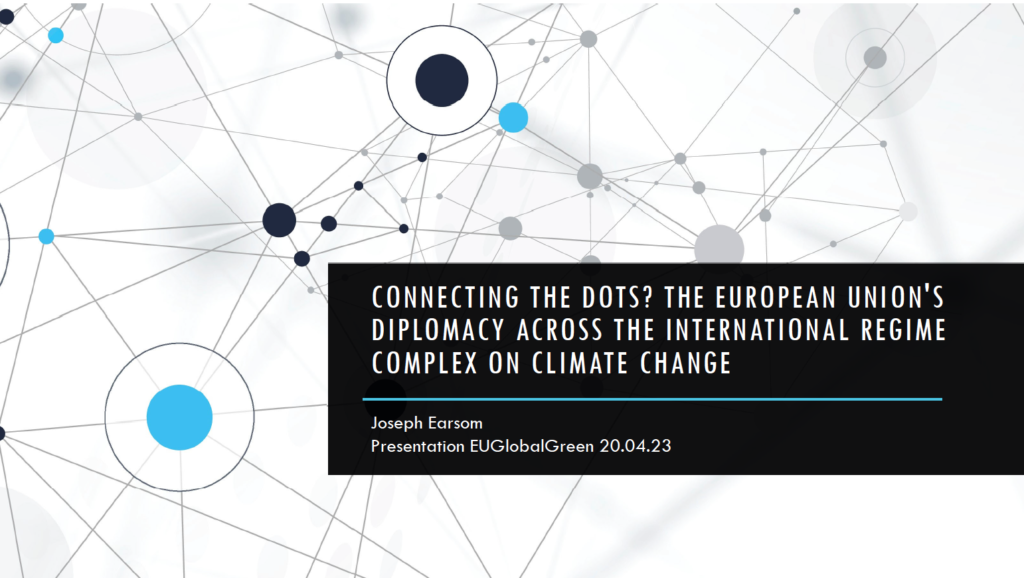
Speakers series #4 – Quel rôle pour l’UE dans le contexte de la crise écologique ?
Friday March 31, 2023
With Angèle Minguet (Docteure en science politique et chercheuse associée au CReSPo)
Discussant: Mihnea Tănăsescu (Docteur en science politique, UMons)
Abstract: Nous assistons à une transformation brutale, sévère et durable des relations entre l’humanité et le milieu naturel. Le Stockholm Resilience Center a défini neuf limites planétaires à ne pas franchir afin d’éviter un changement d’état irréversible de l’écosystème. En mai 2022, une étude publiée dans Nature annonçait que la sixième de ces limites venait d’être dépassée. D’un point de vue épistémologique, s’est immiscée plus que jamais l’idée que l’humain n’est pas le seul acteur de l’Histoire, qu’il doit composer avec le monde qui l’entoure. Cela n’est pas sans conséquences sur la conception du vivre ensemble.
Dans ces conditions, de quelle manière le droit et les politiques publiques s’adaptent-t-ils, tant au niveau national qu’international ?
Cette intervention se propose de présenter la situation européenne, ses enjeux (illustrés par le biais d’une récente étude sur la durabilité des importations alimentaires belges), et les propositions législatives de la Commission européenne d’Ursula Von der Leyen.
Speakers series #3 – ‘A force for good’ : the narrative construction of ethical EU–Vietnam trade relations
With Camille Nessel (Ghent University)
Political representation of problems includes an aim to control an audience’s impressions and create a societally-acceptable social reality. This paper analyses the narrative construction of ethical trade between the European Union (EU) and Vietnam. As an undemocratic Other, Vietnam has been sharply criticized for its human rights record by civil society and Members of European Parliament. Yet, the EU recently concluded two trade agreements with Vietnam. We argue that, unchallenged by the European Parliament, the European Commission created a performative ‘story of change’ for its European audience by simultaneously appealing to underlying ‘neoliberal’ and ‘development’ paradigms. In this narrative, the EU and Vietnam star as the main characters, who, in their joint attempts to make bilateral trade ‘a force for good’, live moments of heroism, encounter fleeting instances of victimhood, and defeat villains on the path to ethical trade.
Speakers series #2 – Governing Institutional Complexity: The Case of Multilateral Environmental Agreements
Monday Novembre 21, 2022
with Rakhyun Kim (Utrecht University)
Discussant: Delphine Misonne (USL-B)
Abstract: Every month, governments around the world gather to make important decisions to solve global environmental problems. However, their decisions often lead to new, and sometimes even more chronic and severe, environmental problems – what is known as global ‘environmental problem-shifting’. With over a thousand international environmental treaties in force, the scale and complexity of environmental problem-shifting is severe and expected to increase. PROBLEMSHIFTING explains why problem-shifting occurs between international environmental treaties and examines the systemic effects of problem-shifting in global environmental governance. Building on these findings, we offer innovative governance solutions that help ensure our global environmental efforts add up to a net positive impact.
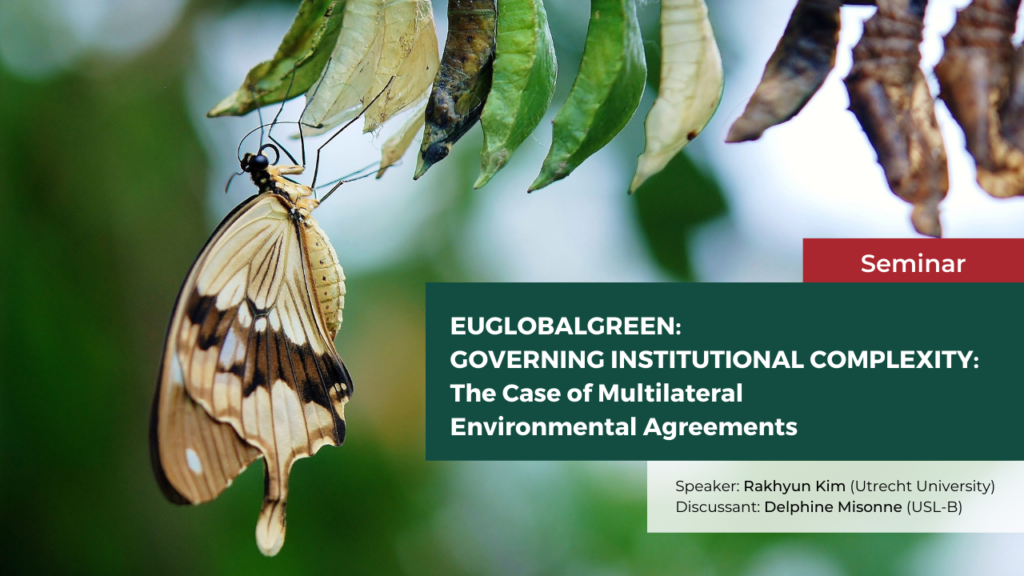
The video is available on request @ThereseDavio
Speakers series #1 – Guerre et écologie: l’environnement et le climat dans les politiques de défense
Friday October 21, 2022
with Adrien Estève (Institut de Recherche Stratégique de l’Ecole Militaire) presenting his new book.
Discussant: Amandine Orsini (USL-B)
Abstract: Cet ouvrage s’intéresse à la prise en compte des enjeux environnementaux et climatiques dans un secteur jusque-là peu étudié dans la littérature sur le sujet : le secteur de la défense. Cet ouvrage montre ainsi comment les questions environnementales et climatiques ont été problématisées au sein du secteur de la défense à partir des cas de la France et des Etats-Unis.

